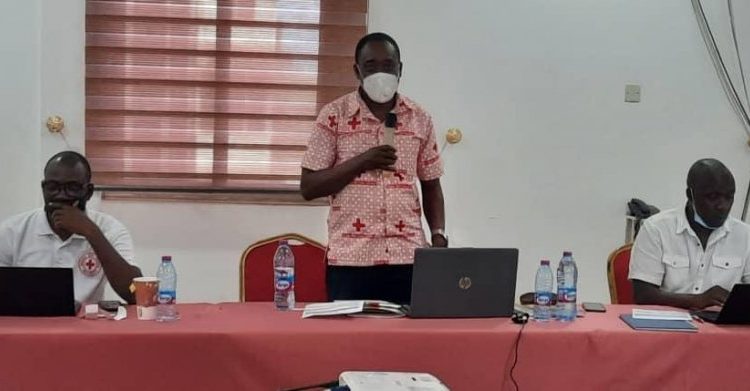The Ghana Red Cross Society has been lauded for its contribution to improve maternal and child health care services in the country through the Mother, Newborn and Child Health (MNCH) project.
Mr Rexford King James Adjei, Health Promotion Officer at the Upper East Regional Health Directorate, who gave the commendation, recounted the several activities implemented under the MNCH project for the benefit of pregnant women and the support for the Ghana Health Service.
Mr Adjei said the project helped to reorient the maternal health-seeking behavior of the people and improved the capacity of health facilities and, thereby, ensuring quality maternal and neonatal health care delivery.
He was speaking at a meeting in Tamale to disseminate the end-line survey and project assessment report on the MNCH project, which was implemented in collaboration with the Ghana Health Service (GHS) with funding from the Swiss Red Cross.
The MNCH was implemented in the Northern, Upper East and Savannah Regions from 2018 to 2020 to contribute towards improved health status of mothers, new-borns, and children under-five years with a special focus on improved health behaviour and increased access to health services among beneficiaries in targeted communities.
Under the project, Mothers’ Clubs trained on maternal, neonatal and child health care and family-related issues were formed at communities in beneficiary districts in the three regions.
The districts included Saboba, Tatali-Sanguli, Kpandai, North Gonja, Kasena-Nankana, Bongo, Nabdam, Talensi, Binduri and Pusiga.
The Mothers’ Clubs sensitised communities on the GHS approved behaviour change messages, including family planning and danger signs in MNCH behaviours as well as on danger signs in MNCH to ensure the well-being of pregnant women, lactating mothers and newborns.
The end-line survey and project assessment report showed that there was a significant improvement in health knowledge, danger signs, what to do to stay healthy, the best place of delivery, prenatal care, normal indicative signs of labour and exclusive breastfeeding, amongst others.
It, however, found that there were differences between knowledge and practice.
It recommended that the project should continue to use multiple social and behaviour change communication interventions and approaches (house-to-house activities, community durbars, interactive radio shows) to help improve the situation.
The next phase of the project will be implemented from 2021 to 2024.
Mr Adjei said “The Ghana Red Cross Society impacted knowledge on maternal care to pregnant women using mothers’ clubs, who accompanied pregnant women to ANC and during delivery. Thus they encouraged women to have skilled birth delivery at health facilities.”
He added that “Beyond that, they also supported us with equipment. Last year, Ghana Red Cross supported the Upper East Regional Health Directorate with 22 tricycle ambulances. They also gave us 73 hemocue machines, which are used to check blood level.”
He said the support had helped to reduce maternal and child mortality in the region, emphasising “If women are supposed to deliver at home, it will be difficult to monitor them but while they come to health facilities, we are able to give the necessary support in terms of skilled birth attendants. So, even if there are risk factors, we will be able to mitigate them and reduce those who might have passed on as a result of giving birth.”
Similar testimonies were shared by representatives of beneficiary districts from the other two regions.
Mr Thomas Okollah Oyugi, the Country Coordinator of the Swiss Red Cross, said the partners would continue to work to consolidate efforts and funds in one area to achieve maximum results appealing to all stakeholders to work together and in a consolidated manner to save resources.
Mr Samuel Kofi Addo, Secretary-General of the Ghana Red Cross Society, called on stakeholders to support the next phase of the project to improve maternal and neonatal care services in the country. GNA




Comments are closed.